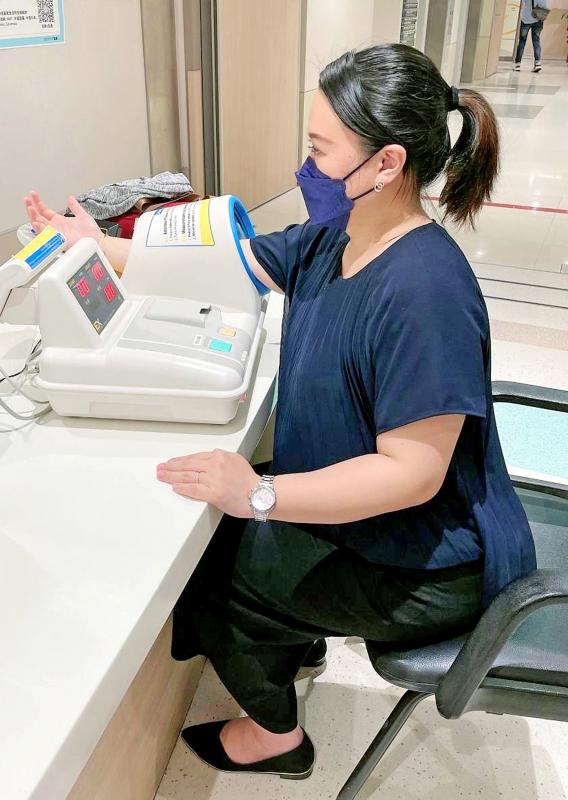Pregnant women with hypertension must take medications regularly to reduce the risk of preeclampsia or premature birth, a doctor has said.
The risk of preeclampsia or premature birth before week 35 of pregnancy can be lowered if women with chronic hypertension receive treatment and keep their blood pressure within a normal range, they said, citing a recent medical study.
The research — which was led by the Heart, Lung and Blood Institute of the US National Institutes of Health and published last month in the New England Journal of Medicine — studied 2,408 pregnant women who were diagnosed with chronic hypertension prior to week 23 of pregnancy.

Photo courtesy of Chang Gung Memorial Hospital
As Taiwanese delay getting married and having children, more women have diseases related to hypertension during pregnancy, Hung Tai-ho (洪泰和), president of the Taiwan Society of Perinatology and a physician in Chang Gung Memorial Hospital’s obstetrics and gynecology department, said yesterday, citing the study.
Five percent of pregnant women are estimated to experience diseases related to hypertension — including chronic hypertension, which is diagnosed prior to pregnancy; hypertension, which is diagnosed after week 20 of pregnancy and continues beyond week 12 after giving birth; gestational hypertension, which is diagnosed after week 20 of pregnancy, but where the blood pressure returns to normal after week 12 following giving birth; preeclampsia, which is gestational hypertension combined with high levels of protein in the urine; eclampsia, which is preeclampsia with widespread seizures; and a combination of chronic hypertension and preeclampsia.
Pregnant women with chronic hypertension have a higher risk of developing gestational diabetes mellitus — a condition in which a hormone made by the placenta prevents the body from using insulin effectively — serious hypertension that leads to stroke, and preeclampsia and eclampsia, which can jeopardize the mothers’ heart, lungs, liver, kidneys and blood coagulation, Hung said.
Such women are likely to have placentas that malfunction, which could restrict the growth of the fetus, cause premature birth, or require medical personnel to induce labor if the condition of the mother or fetus deteriorates, he said.
Retrospective and observational studies have shown that prescribing antihypertensive medications for pregnant women with mild hypertension — a systolic blood pressure of between 140mm and 160mm and a diastolic blood pressure of between 90mm and 110mm — seems to be related to the bearing of small babies — birthweights below the 10th percentile for babies of the same gestational age, Hung said.
The relationship might result from the effect of the antihypertensive medications on blood flow in the placenta, leading to the restriction of fetal growth, he added.
Hypertension is among the top three leading causes of death for pregnant women in Taiwan, Hung said, adding that the study published in the New England Journal of Medicine could serve as an important reference for gynecologists and cardiologists treating pregnant women with hypertension.
Pregnant women with hypertension should measure and record their blood pressure in the morning and at night, which could help their doctors adjust their medications, he said.
If these women experience headaches, blurry vision, shortness of breath or severe pain in the upper or right upper abdomen, they should seek medical attention immediately, he added.

A group of Taiwanese-American and Tibetan-American students at Harvard University on Saturday disrupted Chinese Ambassador to the US Xie Feng’s (謝鋒) speech at the school, accusing him of being responsible for numerous human rights violations. Four students — two Taiwanese Americans and two from Tibet — held up banners inside a conference hall where Xie was delivering a speech at the opening ceremony of the Harvard Kennedy School China Conference 2024. In a video clip provided by the Coalition of Students Resisting the CCP (Chinese Communist Party), Taiwanese-American Cosette Wu (吳亭樺) and Tibetan-American Tsering Yangchen are seen holding banners that together read:

UNAWARE: Many people sit for long hours every day and eat unhealthy foods, putting them at greater risk of developing one of the ‘three highs,’ an expert said More than 30 percent of adults aged 40 or older who underwent a government-funded health exam were unaware they had at least one of the “three highs” — high blood pressure, high blood lipids or high blood sugar, the Health Promotion Administration (HPA) said yesterday. Among adults aged 40 or older who said they did not have any of the “three highs” before taking the health exam, more than 30 percent were found to have at least one of them, Adult Preventive Health Examination Service data from 2022 showed. People with long-term medical conditions such as hypertension or diabetes usually do not

Heat advisories were in effect for nine administrative regions yesterday afternoon as warm southwesterly winds pushed temperatures above 38°C in parts of southern Taiwan, the Central Weather Administration (CWA) said. As of 3:30pm yesterday, Tainan’s Yujing District (玉井) had recorded the day’s highest temperature of 39.7°C, though the measurement will not be included in Taiwan’s official heat records since Yujing is an automatic rather than manually operated weather station, the CWA said. Highs recorded in other areas were 38.7°C in Kaohsiung’s Neimen District (內門), 38.2°C in Chiayi City and 38.1°C in Pingtung’s Sandimen Township (三地門), CWA data showed. The spell of scorching

POLICE INVESTIGATING: A man said he quit his job as a nurse at Taipei Tzu Chi Hospital as he had been ‘disgusted’ by the behavior of his colleagues A man yesterday morning wrote online that he had witnessed nurses taking photographs and touching anesthetized patients inappropriately in Taipei Tzu Chi Hospital’s operating theaters. The man surnamed Huang (黃) wrote on the Professional Technology Temple bulletin board that during his six-month stint as a nurse at the hospital, he had seen nurses taking pictures of patients, including of their private parts, after they were anesthetized. Some nurses had also touched patients inappropriately and children were among those photographed, he said. Huang said this “disgusted” him “so much” that “he felt the need to reveal these unethical acts in the operating theater